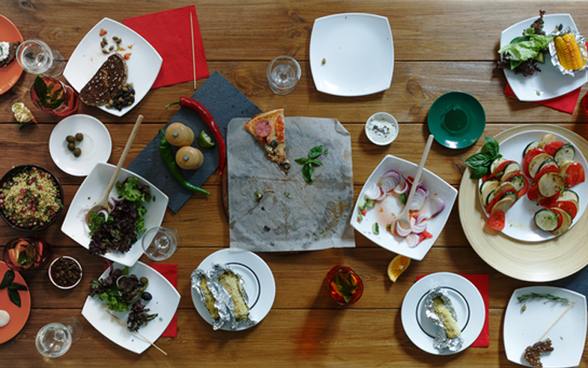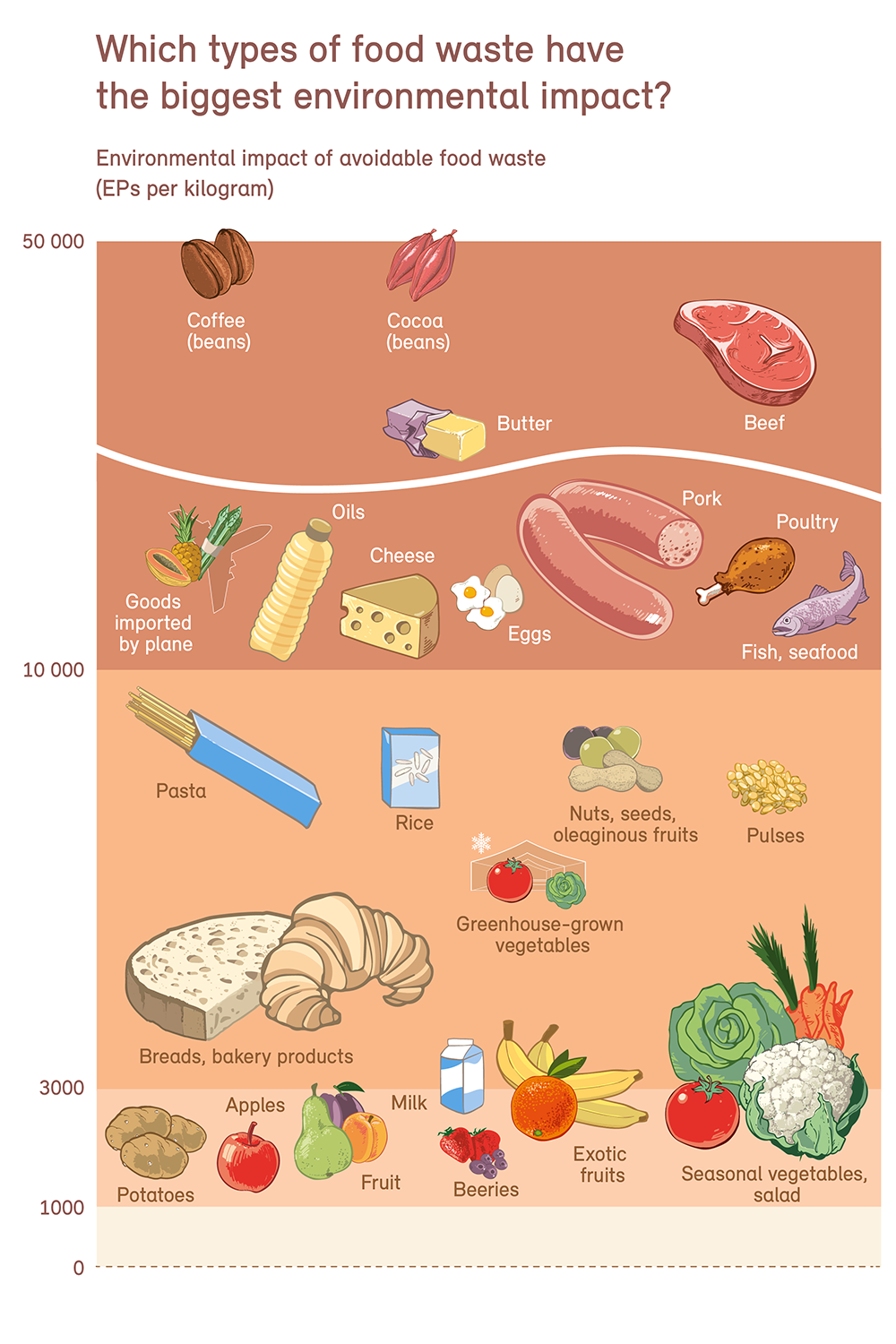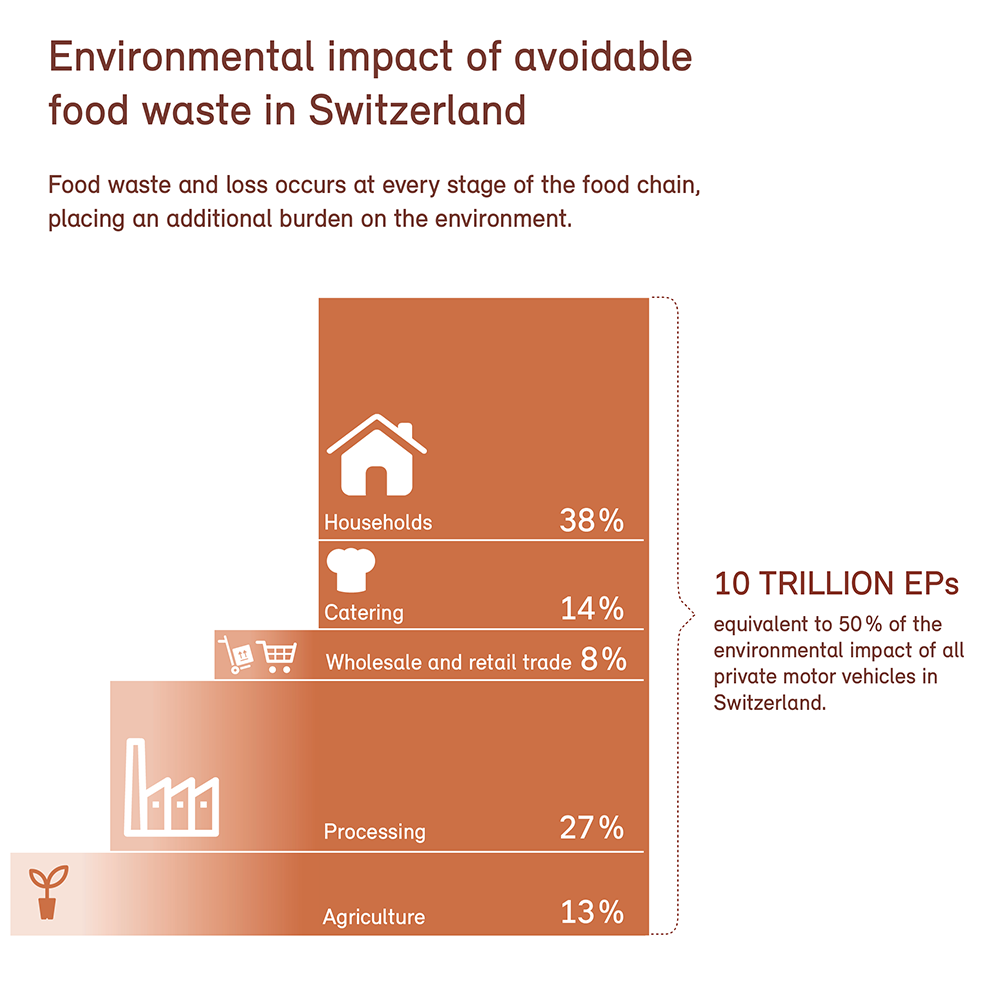When food is produced but not consumed, this leads to unnecessary CO2-emissions, biodiversity loss and land and water consumption. 25 per cent of the environmental impact of our food system is due to food waste (i.e. avoidable food losses). This corresponds to about half the environmental impact of motorised private transport in Switzerland. With the action plan to reduce food waste, the Federal Council wants to halve avoidable food losses by 2030 compared to 2017. This is in line with Sustainable Development Goal 12.3 of the 2030 Agenda for Sustainable Development.

Avoidable and unavoidable food losses
Food losses and food waste refer to all food intended for human consumption that is not consumed by humans.
Food waste is the term used to describe avoidable food loss. These are the edible portions of food that are produced for human consumption, but end up not being consumed by humans.
Unavoidable food losses are, for example, parts of food that are not edible or are considered inedible in our culture.
Swiss food losses from the field to the plate
Around one third of all edible food is lost or wasted between the field and the plate. According to a study by ETH Zurich by Beretta and Hellweg (2019) on food waste, this amounts to around 2.8 million tonnes of wasted food per year in Switzerland and abroad as a result of Switzerland's food consumption (consumer perspective). This corresponds to about 330 kg of avoidable food loss per person per year. Of the 2.8 million tonnes, around 360,000 tonnes of food loss occur abroad, in the production of food that is imported into Switzerland. Losses abroad are not included in the food disposal statistics because they do not have to be disposed of in Switzerland. In addition, around 240,000 tonnes of avoidable food losses occur in Switzerland in the production of food for export. These losses are taken into account in the food disposal statistics, but not in the food consumption statistics (see table below).
|
Avoidable food losses in Switzerland* |
Avoidable food losses and environmental impact caused by Swiss consumption along the entire value chain** | |
|---|---|---|---|
| Unit | Tonnes of fresh weight | Tonnes of fresh weight | Environmental impact (EIA) in percentages |
Agriculture |
197,000t |
556,000t |
13% |
Processing |
1,205,000t |
963,000t |
27% |
Wholesale and retail trade |
279,000t |
279,000t |
8% |
Food service |
210,000t |
210,000t |
14% |
Households |
778,000t |
778,000t |
38% |
Total |
2,669,000t |
2,786,000t |
100% |
**including food losses due to imports and minus food losses due to exports: consumer perspective
Recycling or disposal channels |
Avoidable food losses in tonnes of fresh weight per year |
|---|---|
Waste incineration |
474,000t |
Composting in the field |
359,000t |
Composting plant |
205,000t |
Garden composting |
27,000t |
Fermentation |
516,000t |
| Animal feed | 1,030,000t |
| Waste water | 175,000t |
Total |
2,786,000t |
Environmental impact due to avoidable food losses
The food system amounts to around 28% of Switzerland's total footprint. A quarter of this is the result of avoidable food losses. The implementation of the halving target in Switzerland would reduce the environmental impact and greenhouse gas emissions of food by 10-15%.
The environmental impact of a tonne of food waste varies greatly depending on which products it is made up of and where in
the value chain it occurs. Food waste should be avoided as a priority in the case of foods that have a particularly high environmental impact or are produced in large quantities. The food categories with the greatest environmental impact per kilogramme of food loss are meat, coffee and cocoa beans, butter, eggs, products imported by air, and oils and fats, fish and cheese. The losses of fruits and vegetables (including in particular potatoes) as well as breads and baked goods are also environmentally relevant, despite a lower environmental impact per kilogramme, because they occur in large quantities.
The environmental impact of a food product also increases with each stage of processing and/or transport, as these processes involve resource consumption and produce emissions. In addition, losses in the processing industry and to some extent in agricultural production tend to be recycled to a higher value (especially as animal feed) than at the other stages of the food chain. Environmental credits are granted for the substituted products (mainly animal feed).
Food losses in Switzerland: Environmental impact and mitigation potential (PDF, 5 MB, 25.10.2019)(document available in German with english abstract) on behalf of the FOEN
Action plan to reduce food waste
On 6 April 2022, the Federal Council adopted an action plan against food waste, in response to the Chevalley Postulate 18.3829 (available in Geman, French and Italian). The action plan is addressed to all companies and organisations in the food industry along the supply and value chains, and to the federal government, cantons and communes. The action plan against food waste has three objectives:
1. Halving the amount of avoidable food losses in Switzerland by 2030 compared to 2017
2. Defining industry-specific reduction targets together with the industries
3. Reducing the environmental impact of avoidable food losses as much as possible through the appropriate formulation and prioritisation of measures
The action plan is divided into two phases. The first phase (2022-2025) comprises seven self-regulatory measures for the economy, five measures for the public sector and two measures on information and education. In 2025, the Confederation will publish up-to-date data on food losses at all levels of the supply and value chain, i.e. agriculture, processing industry, trade, food service and households, and analyse whether the measures of the action plan are sufficient.
Cross-industry agreement on reducing food losses
The cross-industry agreement on reducing food losses is an important element of the action plan. The agreement creates a framework that enables a coordinated approach to the economy's implementation of self-regulatory measures, raising awareness of positive examples, and striving for and communicating cross-industry progress. By signing the agreement, the parties commit to halving avoidable food losses by 2030. The companies and associations from trade, the food service industry, food processing and agriculture will set measurable reduction targets and take appropriate measures for each stage of the value chain. All parties to the agreement will report annually on avoidable food losses and the measures they are taking to reduce them. The FOEN will regularly provide information on the participants' joint reductions.
The agreement was signed on 12 May 2022 by Federal Councillor and DETEC head Simonetta Sommaruga and 28 members of management from companies and associations in the Swiss food industry.
Other companies and associations in the food industry can sign the cross-sectoral agreement at any time. Would you like to help cut avoidable food losses? Then get in touch with us (see contact box at the top right).
- Aldi Suisse AG
- Bigler AG
- Compass Group (Schweiz) AG
- Coop Genossenschaft
- Danone AG
- Denner AG
- Eldora AG
- Emmi AG
- fenaco Genossenschaft
- Föderation der Schweizerischen Nahrungsmittel-Industrien (fial)
- GastroSuisse
- Genossenschaft ZFV-Unternehmungen
- Hiestand Schweiz AG
- HotellerieSuisse
- IKEA Switzerland
- Lidl Schweiz AG
- Manor AG
- Migros-Genossenschafts-Bund
- Nestlé Suisse S.A.
- Novae Restauration SA
- Orior AG
- Pistor AG
- Pflegezentrum im Spitz, Kloten
- Proviande Genossenschaft
- Schweizerischer Bäcker-confiseurmeister-Verband (SBC)
- Sodexo (Switzerland) AG
- SV (Schweiz) AG
- Swiss Association of Nutrition Industries (SANI)
- Swiss Retail Federation
- Swisscofel
- Swisspatat
- Unilever Schweiz GmbH
- Valora Group
- Verband Schweizer Gemüseproduzenten (VSGP)
- Volg Konsumwaren AG
Further Information
Last modification 17.08.2023
Contact
Federal Office for the Environment FOEN
Economics and Innovation Division
Postal address:
CH-3003 Bern
Location of our offices:
Monbijoustrasse 40, 3003 Bern
Tel.: +41 58 461 38 76









